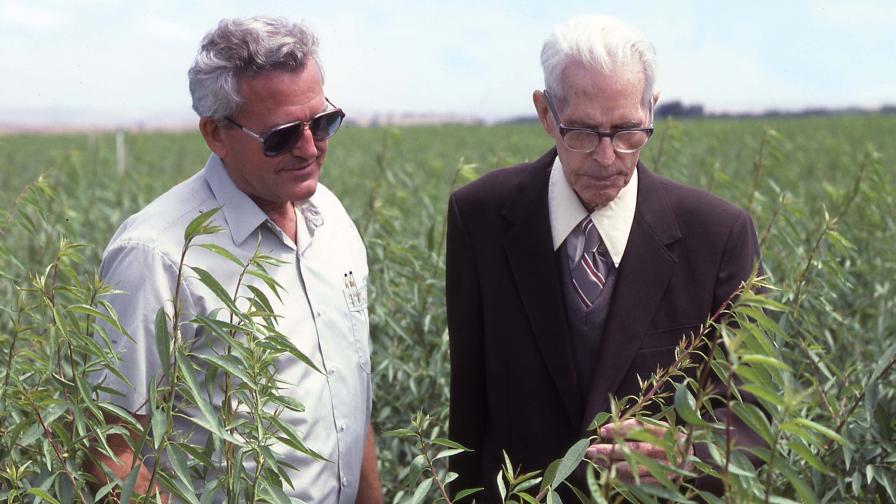Burchell Nursery Celebrates 80 Years in the Fruit and Nut Business

Burchell President Tom Burchell (left) can often be found looking at new varieties, just as his father Bill (center) and grandfather Irvin before him, pictured here in 1987.
Photo courtesy of Burchell Nursery
Burchell Nursery will be holding a celebration of the nursery’s 80th anniversary this coming October, welcoming customers and friends to the Oakdale, CA nursery.
Nursery President Tom Burchell says plans aren’t set, but they’re talking about reviewing a list of the many fruit and nut varieties the nursery has developed since being founded in 1942 by Tom’s grandfather, Irvin, in nearby Modesto, CA. The nursery, which long had growing grounds in Oakdale, moved their headquarters there in 1997.
In addition, Burchell says they plan to highlight what it means to be a part of the region’s business community, as they also have a location in Fresno, though the celebration will be limited to Oakdale. He says he will stress that Burchell will be a part of that community for a long time, as his son Jake, the fourth generation, is graduating from Fresno State University this year and is planning to join the business.
The varieties developed under the auspices of Founder Irvin Burchell, and later, Tom’s father Bill, who served as president from 1970 to 2004, include many that have become go-to varieties for growers through the years. These include the ‘O’Henry’ peach, the ‘Rose’ nectarine, and the ‘Elegant Lady’ peach — one of the popular ‘Lady’ series — developed through Grant Merrill’s breeding program in the 1970s and ’80s.
After focusing on fruit varieties for many years, Burchell developed its own in-house nut breeding program in 1998. Several well-known almond varieties have come from the program, including ‘Monterey’, ‘Wood Colony’, ‘Carmel’, ‘Fritz’, and most recently, ‘Shasta’ and ‘Pyrenees’, both self-pollinating varieties.
“For the future, having a breeding program to develop new varieties that will benefit the industry and address the needs of the farmers and the consumers is a long term-goal,” Burchell says. “There is always the prize out ahead that if we listen to what the industry needs, make smart crosses that yield new and beneficial varieties, growers will plant them, and we can sustain this industry together.
“My grandfather had a motto, ‘Plant good trees on good land, take care of them, and they will take care of you.’ It is the concept that we are in this together for the long run to benefit the grower with good varieties, and the grower will benefit from good trees that will take care of them and, in turn, support the industry as a whole.”









